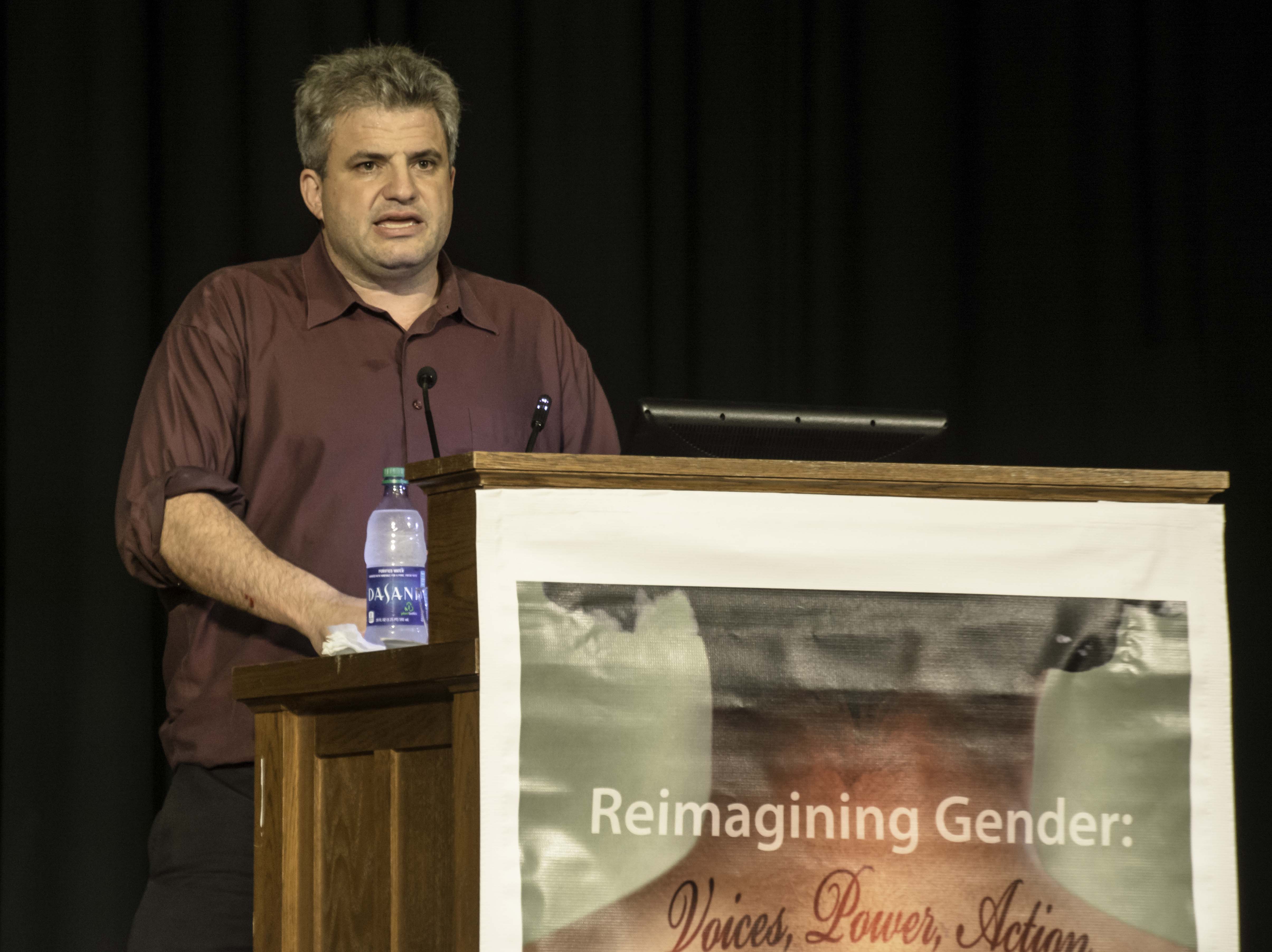Photo by Autumn Walter | David Zirin took the stage at Edward’s Hall during the sixth honor colloquium of the semester to discuss the role gender plays in athletics.
At the sixth honors colloquium Tuesday night, the lecturer, a New York Times bestselling author, said that toxic masculinity in sports is caused by the way in which sports were created 150 years ago.
Dave Zirin, the speaker of this weeks colloquium, Reimagining Masculinity, Sports and Resistance, took the audience through history and looked at sports in a more political view to understand how the gender roles in sports came about.
Sports can teach friendship and sacrifice, but a main point of the lecture was that they can also teach the opposite to young boys, which Zirin refers to as toxic masculinity.
“Being an athlete means entitlement and over deference to authority, close-mindedness,” Zirin said. “And in its most toxic form, seeing women as the spoils of being a star athlete, seeing women as objects.”
To know why sports teach these toxic lessons of masculinity today, Zirin said, one needs to look back 150 years to how organized sports were started in this country.
“Organized sports was organized very explicitly with the idea of teaching young white men, of what I would argue, a very destructive brand of masculinity,” Zirin said.
At the end of the 19th century, robber barons and other titans of industry feared that they were raising weak pampered children, unprepared to navigate the world in the new century. Sports were used as a way to toughen the young generation and were then propagated at the most elite colleges in the country: Harvard, Yale and Brown.
“I would argue that so much of what is toxic about sports today goes back to this foundational level of sports in the United States.”
According to Zirin, for women, sports was something they were denied from because it was about denying them a training ground to become leaders in the new American century.
“Every institution from the church, government and the medical community aimed to keep women off the field,” said Zirin.
The invention of the bicycle was a turning point for women, according to Zirin. “The bicycle became the symbol of liberation and the suffrage movement at this time.”
When you ride a bicycle you can’t wear a corset or a hoop skirt, it led to mobility, exercise and changing the way women dressed to ride a bicycle, said Zirin. However, the Journal of American Medicine published an article saying that for women to ride bicycles, they were in danger of getting “bicycle face.” Bicycle face consisted of “a protruding jaw, wild staring eyes and a strangled expression,” according to the journal.
The medical community also said that riding a bicycle would cause infertility and the implosion of the uterus.
The speaker, after going through the societal mistreatment of women in sports, linked it to the idea that men in sports would create “manly qualities,” like leadership, aggression and the ability to lead in the new century. A way of keeping women from accessing those qualities, was keeping them from accessing sports, said Zirin.
“It’s important to know as long as women were denied the ability to play sports,” Zirin said, “that’s how long women have fought to play sports.”
Zirin also touched on Title IX and how he feels it not only changed the relationship between women and sports, but men and sports as well. The speaker talked about the undeniable benefit the legislation had on women in the country. He said that now, one in three women play sports and before Title IX, it was one out of 29.
According to the Women’s Sports Foundation, women are less likely to have eating disorders, less likely to be in abusive relationships and less likely to become pregnant in their teens. “Playing sports puts young girls on a different path,” said Zirin. “And just having access to sports has a tremendous change in people’s lives.”
Zirin said that women’s advance in sports has a positive impact on the most toxic sides of masculinity in sports.
When talking about masculinity in sports, Zirin said, it is important to connect it to athlete activism in today’s society. He said that Colin Kaepernick is the most visible right now, however, he mentioned that the women of the WNBA started wearing black after the killings of Alton Sterling and Philando Castile, a summer before Kaepernick took a knee during the anthem.
Zirin said that the politics of sports never even occurred to him until 1996 when he was in college. A basketball player in the NBA during the time, named Mahmoud Abdul-Rauf, made the private decision to not come out during the national anthem before games because he said the flag symbolizes oppression and tyranny to some.
Rauf’s actions inspired Zirin to start down a path to think critically about sports and the role athletes could play in society. He decided to focus on the idea of masculinity in sports. Zirin said, “I would argue that there’s no greater force in our society, not Hollywood, not the military, not even Fortnite, that actually shapes masculinity quite like the world of sports.”





